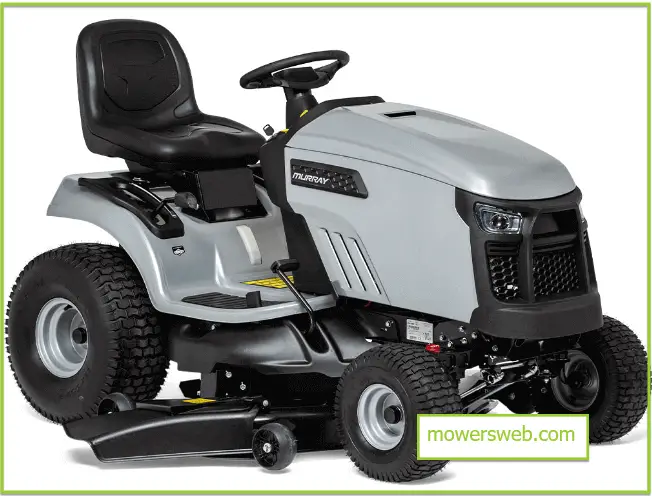Lawn mowers are essential for maintaining our lawns’ appearance and health.
They allow us to quickly and efficiently cut grass, keeping it neat and well-groomed. However, despite their usefulness, lawn mowers often have a hard life.
In this post, we’ll explore some of the reasons why lawn mowers may have a tough time and what we can do to help extend their lifespan.
Let’s jump in.

Why does a lawn mower live such a hard life?
One of the main reasons why lawnmowers have a hard life is due to the harsh conditions they are subjected to.
Lawn mowers are often used in outdoor environments, where they are exposed to the elements, including rain, wind, and sunshine.
Read What is the Legal Age to Operate a Lawn Mower?(Find Out!)
Conditions that Affect a Lawn Mower
These conditions can take a toll on the lawn mower, causing wear and tear on its parts and components.
1. Harsh weather conditions
In addition to the harsh weather conditions, lawn mowers must contend with rough terrain.
Lawns can be uneven, with bumps, dips, and other obstacles that can strain a lawn mower.
This can lead to mechanical issues and breakdowns, which can be costly to repair and frustrating for the user.
2. Type of Grass and Debris
Another factor that can contribute to the hard life of a lawn mower is the type of grass and debris that it encounters.
Some lawns may have thicker, more resilient grass, which can be difficult to cut and can put extra strain on the lawn mower.
Similarly, if a lawn mower encounters sticks, rocks, or other debris, it can damage the blades or other parts of the machine.
Furthermore, lawn mowers often have to work hard to maintain large lawns, which can take a lot of time and effort.
This can put a lot of wear and tear on the lawn mower, as it has to run for longer periods and cover a larger area.
Read What Size Mower for 10 Acres?(Tips for Perfect Size)
How to Extend the Lifespan of a Lawn Mower
In order to help extend the lifespan of a lawn mower and reduce the strain on the machine, there are a few steps that homeowners can take.
First and foremost, it’s important to properly maintain and care for your lawn mower.
This includes regularly cleaning and lubricating the blades and other parts, as well as replacing worn or damaged parts as needed.
It’s also a good idea to keep the lawn mower stored in a dry, sheltered area when not in use to protect it from the elements.
Another way to help extend the lifespan of a lawn mower is to use it correctly and follow the manufacturer’s instructions.
This includes using the correct fuel and oil, as well as only using the lawn mower for its intended purpose.
Overloading the lawn mower or using it to cut inappropriate materials can lead to damage and shorten its lifespan.
Finally, it’s a good idea to invest in a high-quality lawn mower that is built to withstand the rigors of outdoor use.
While it may be tempting to go for a cheaper option, a more expensive, well-made lawn mower is likely to have a longer lifespan and require fewer repairs over time.
Read Low Oil Symptoms in Lawn Mowers (Don’t Ignore These Signs)
How to increase The Lifespan Of Your Lawn Mower
There are several steps you can take to increase the lifespan of your lawn mower:
1. Keep it clean
Regularly clean the undercarriage of your lawn mower to remove grass clippings and debris. This will prevent rust and other damage from forming.
2. Store it properly
When not in use, store your lawn mower in a dry, covered area to protect it from the elements.
3. Sharpen the blade
A dull blade can tear the grass, leading to damage and a less attractive lawn. Sharpen the blade regularly to ensure a clean, even cut.
4. Change the oil
Regularly changing the oil in your lawn mower will help keep it running smoothly and extend its lifespan.
5. Check the spark plug
A malfunctioning spark plug can cause your lawn mower to run poorly or not start at all. Replace it as needed to keep your lawn mower running smoothly.
6. Follow the manufacturer’s recommendations
Make sure to follow the manufacturer’s recommendations for maintaining your lawn mower. T
his includes things like how often to change the oil and spark plug, as well as any other specific maintenance tasks.
Read Is there a Lawn Mower Emoji(Emoji Update)
How often should you change your lawn mower?
It is generally recommended to change your lawn mower every 8-10 years, depending on the type and how often it is used.
How often should you replace your lawn mower?
However, a few factors can affect the lifespan of a lawn mower and may require it to be replaced sooner. These include:
- How often is the mower used, If you have a large lawn and use it frequently, it may need to be replaced sooner than if you have a small yard and only use it occasionally.
- Maintenance – Proper maintenance, such as regularly cleaning and replacing the air filter and spark plug, can help extend the life of your lawn mower. Neglecting maintenance can cause the mower to wear out more quickly.
- Quality – Higher-quality mowers tend to last longer than lower-quality ones. If you invest in a top-of-the-line mower, it may last longer than a cheaper model.
Read Spartan Mowers Are Junk(My 5 Take)
Lawn Mower Parts Explained
| Lawn Mower Part | Description |
|---|---|
| Engine | Power source that runs on gasoline; includes fuel tank, carburetor, air filter, and spark plug. |
| Blades | Rotating components that cut the grass; can be single or multiple blades in a cutting deck. |
| Cutting Deck | Housing that encloses the blades and directs grass clippings; often adjustable for cutting height. |
| Wheels | Provide mobility; attached to axles for movement and turning. |
| Handle or Handlebars | Gripped for operation; includes controls for starting, stopping, cutting height, and blade engagement. |
| Throttle Control | Lever or dial to adjust engine speed and power output. |
| Pull Cord or Electric Start | Pull cord for manual start or electric start button; begins engine operation. |
| Grass Bag or Chute | Collects grass clippings; baggers or chutes direct clippings to a specific area. |
| Drive System (Self-Propelled Mowers) | Powers wheels for easier pushing; controlled via handlebars. |
| Height Adjustment Mechanism | Raises or lowers cutting deck to adjust grass cutting height. |
| Safety Features | Includes deadman’s switch to stop engine when handle is released, enhancing safety. |
| Mulching Kit (Optional) | Enables finely chopped clippings to be used as natural fertilizer. |
Final Remark
While lawnmowers are essential for maintaining our lawns, they often have a hard life due to the harsh conditions they are subjected to.
By properly maintaining and caring for your lawn mower, using it correctly, and investing in a high-quality machine,
You can help extend its lifespan and ensure that it continues to perform at its best.
Read Lawn Mowers for Tall People(7 Best Mowers)
FAQ
Why does a lawn mower have a hard life?
Lawn mowers often endure a challenging life due to various factors related to their purpose and usage. Here are some common reasons:
- Frequent and demanding use: Lawn mowers are typically employed for maintaining lawns, gardens, and other outdoor spaces. They often have to tackle extensive areas and endure regular use, which can lead to wear and tear.
- Exposure to harsh conditions: Lawn mowers operate in diverse weather conditions, including extreme heat, cold, rain, and even dust storms. These elements can place significant stress on the mower’s components and affect its overall performance.
- Rough terrain and obstacles: Mowers have to navigate uneven terrain, slopes, rocks, tree roots, and other obstacles present in outdoor environments. Such conditions can strain the mower’s engine, blades, and chassis, potentially leading to damage.
- Grass and debris accumulation: Mowing involves cutting grass, leaves, and other debris, which can accumulate and clog the mower’s cutting deck, air filters, and discharge chute. This buildup can reduce the mower’s efficiency and even cause it to stall.
- Inadequate maintenance: Insufficient or irregular maintenance practices can contribute to a lawn mower’s difficult life. Lack of proper care, such as infrequent oil changes, dirty air filters, or neglecting blade sharpening, can lead to decreased performance and premature wear.
Can the type of lawn affect the mower’s lifespan?
Yes, the type of lawn or grass being mowed can impact the mower’s lifespan. Some factors include:
- Thickness and density: Thick and dense grass requires more power to cut, which can strain the mower’s engine and transmission. Over time, this can lead to increased wear and reduce the machine’s lifespan.
- Roughness of the terrain: Lawns with uneven surfaces, slopes, or hidden obstacles can pose challenges for the mower. Constantly encountering rough terrain can cause the mower’s components to endure additional stress, potentially shortening their lifespan.
- Moisture content: Mowing wet or damp grass can result in clumping and clogging of the mower’s cutting deck, reducing its effectiveness. Moisture can also promote rust and corrosion if not properly addressed, which can affect the mower’s durability.
How can I extend the lifespan of my lawn mower?
To prolong the lifespan of your lawn mower, consider the following tips:
- Regular maintenance: Follow the manufacturer’s guidelines for maintenance, including oil changes, air filter cleaning or replacement, and blade sharpening. Regularly inspect the mower for loose or damaged parts and address them promptly.
- Proper storage: Store the mower in a clean and dry area, preferably indoors or in a shed, to protect it from the elements. Use a cover to shield it from dust, moisture, and sunlight when not in use.
- Clean the mower: Remove grass clippings, debris, and dirt from the cutting deck, air filters, and other areas after each use. This prevents clogging, improves performance, and reduces the risk of corrosion.
- Use the right fuel: Always use the recommended fuel type and mix ratios specified by the manufacturer. Using incorrect fuel can damage the engine and other components.
- Avoid excessive strain. Take breaks during prolonged mowing sessions to prevent overheating. Avoid mowing overly thick or wet grass, as this can strain the mower’s engine and decrease its lifespan.
- Follow safety guidelines: Operate the mower according to the safety instructions provided by the manufacturer. This includes wearing appropriate protective gear, avoiding steep slopes, and keeping bystanders at a safe distance.




